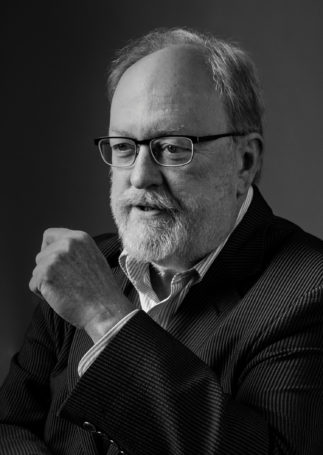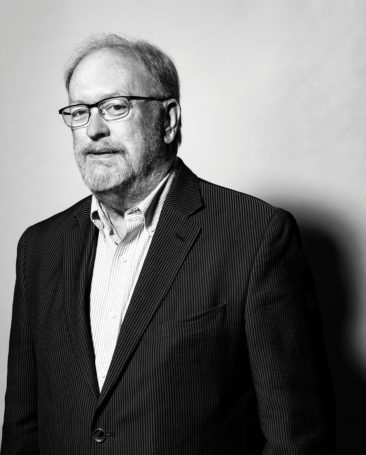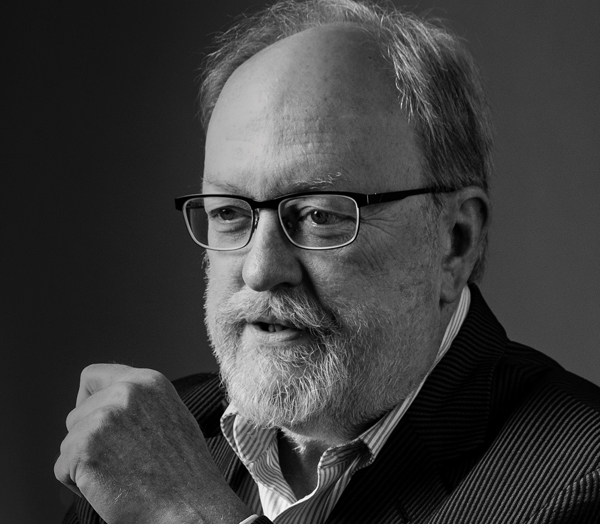Martin Garber-Conrad was a newly minted college graduate when he hit the road for Edmonton from his hometown of Columbus, Ohio. It was 1971 — coincidentally, the same year the Alberta Legislature passed the Edmonton Community Foundation Act — and he’d come for a job helping Lutheran churches administer youth programs.
It was an interesting job for a recent grad and a young person of faith, but not the main reason he chose Edmonton. “My high-school buddy and I had always dreamed of driving up the Alaska Highway to Fairbanks,” he says. “I thought, ‘If I live in Edmonton, I’ll be halfway there already!’ ” While that dream never did come to fruition, Garber-Conrad made the city his home and has since invested decades in improving the community, particularly for its most vulnerable citizens.

Garber-Conrad took a winding road to his career in the non-profit sector. A couple of years after arriving in Edmonton, he left to pursue graduate studies in theology (his first degree is in sociology) in Saskatchewan. Returning to Alberta, he ran his own parish near Leduc for three years before moving to the private sector. He was working for a training consulting firm when he spotted a job opening at E4C (Edmonton City Centre Church Corporation) that seemed a much better fit. “I thought this would be a good way to combine what I’d learned in the private sector with my church background,” he says. While E4C didn’t do religious work, many of the people involved had ties to church ministries — a world he understood well.
E4C was established in 1970 by four local churches to help inner-city people living in poverty. When Garber-Conrad became its second executive director in 1987, it offered just two services: a women’s shelter and a one-person program educating students about the perils of shoplifting. Over the next 18 years, he grew E4C into a sizable non-profit with 200 employees, a budget of $10 million, and several properties. Under Garber-Conrad’s leadership, E4C redeveloped two historic buildings in the city’s downtown — the Gibson Block (to house its Women’s Emergency Accommodation Centre) and Alex Taylor School (for the organization’s headquarters) — and built brand-new affordable housing units. E4C also launched Kids In the Hall Bistro, a program that employs at-risk youth in a restaurant setting and one of the first social enterprises in the city.
Working for E4C afforded Garber-Conrad the opportunity to tackle poverty and affordable housing — two of the causes closest to his heart — and to radically transform an organization. But after 18 years, it was time for a change. When the position of CEO came up at Edmonton Community Foundation (ECF) in 2005, he put his hat in the ring. Garber-Conrad knew ECF through his work at E4C, which had received funding through the foundation during his tenure. He’d also served on the ECF board in the 1990s as a community member.
To his delight, he got the job. “The Foundation was important to the community and doing good work, but I thought it could do more,” says Garber-Conrad. “And I thought the key to its success would be to do even bigger, more important things in the community instead of trying to give little grants to everyone.”
To attain those goals, he wanted ECF to begin working more in partnership with other funders. And under his leadership, the foundation has pooled resources with the City of Edmonton, United Way and other organizations to address various community needs.

The Edmonton and Area Land Trust was created in 2007 by the foundation, City of Edmonton and conservation groups to protect natural areas in the Edmonton area. Garber-Conrad also worked with the city to create the Social Enterprise Fund, which in 2008 began making small loans to organizations looking to build money-making enterprises focused on community good. “It’s given us another tool in our toolbox — another way to help charities and nonprofits beyond what we can do with grants,” says Garber-Conrad. The fund has provided nearly $50 million in financing to 75 projects.
It’s now been three decades since Garber-Conrad began his career in the non-profit realm and his dedication to community has earned him all sorts of accolades. In 2004, he was one of 100 leaders named Edmontonian of the Century for the city’s centennial and in 2013, he received a Queen’s Diamond Jubilee Medal. This year, he received an honorary doctor of laws degree from the University of Alberta.
For Garber-Conrad, these recognitions are flattering — and spotlight the important work of the foundation and non-profit sector — but they aren’t what motivate him. His deep concern for the community and a desire to tackle social ills such as poverty, homelessness and child hunger are what keep him going.
“I’d retire happy if we got even one of those things fixed,” he says. “If there were no homelessness or no more hungry children or no more poverty or no more women being abused. All of them are complex (problems), but they’re not as hard as we make them.”
